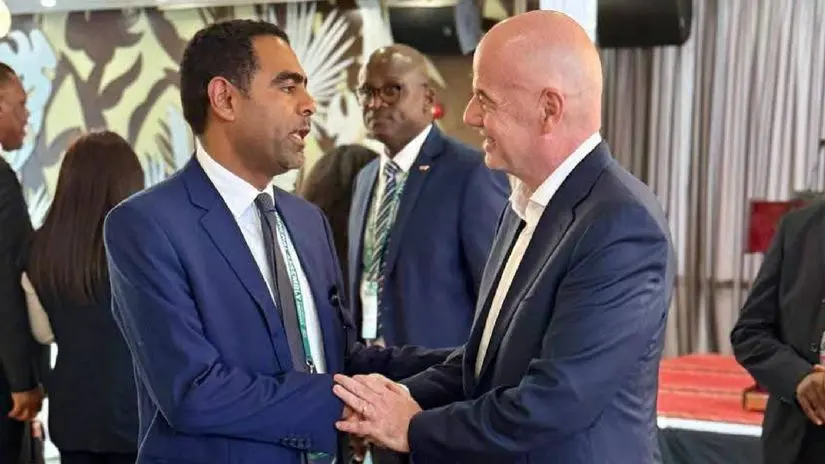Kenyan football woke to a welcome development as the FIFA Appointments of Kenyan Officials placed three familiar names in influential committees, a moment that blends prestige with duty and signals a widening Kenyan footprint in the global game. It is a story of opportunity, accountability, and the patient work of rebuilding trust at home while engaging the wider football world.
At the heart of the news is Football Kenya Federation president Hussein Mohammed, who joins the FIFA Institutional Relations Committee as a member. He is accompanied by Abdullahi Yussuf Ibrahim on the FIFA Stadium and Security Committee, and by Janet Katisya who continues to serve on the FIFA Ethics Committee, a trio that underscores Kenya’s growing voice in crucial governance spaces.
What Hussein Mohammed’s role says about Kenya’s direction
Hussein’s appointment to the Institutional Relations Committee places him in a forum that shapes how FIFA builds and maintains relationships with the International Olympic Committee, the United Nations and its agencies such as UNESCO and UNICEF, governments and NGOs, and other international sports associations. In plain terms, it is where diplomacy meets sport, and where credibility is tested by delivery.
The committee’s leadership reflects its reach. Adwa Al Arifi of Saudi Arabia serves as chair, Bjorn Vassalo of Malta is the deputy, and Romania’s Razvan Burleanu represents the committee at the FIFA Council. The agenda is broad, from offering strategic guidance on relationships to monitoring compliance with governance standards, and promoting FIFA’s global influence across confederations and national associations.
This is Hussein’s first major role in international football since taking over the reins of Kenyan football in December 2024 from Nick Mwendwa. The timing matters, because it arrives as FKF attempts to show that local reforms can sit comfortably alongside international responsibility.
Safety, stadiums and the Ibrahim brief
For Abdullahi Yussuf Ibrahim, the call to the FIFA Stadium and Security Committee is a vote of confidence in Kenya’s capacity to contribute to the backbone of the matchday experience. The committee is instrumental in ensuring safety and security at football events globally, overseeing stadium infrastructure and security protocols that make the game accessible and secure for fans.
The remit is practical and urgent. It spans crowd control, fan behavior, communication, access control, and terrorism prevention, a checklist that defines modern stadium management. The committee is chaired by Frank Paaw of the Netherlands, deputized by Algeria’s Walid Sadi, with Costa Rica’s Rodolfo Villalobos serving as the FIFA Council delegate, a leadership blend that mirrors football’s global footprint.
Ethics, integrity and the Katisya continuum
Janet Katisya continues as a member of the FIFA Ethics Committee, the body that protects good governance and integrity within the game. The committee is responsible for upholding ethical standards and investigating potential breaches, a mandate that cuts to the heart of credibility in world football.
The Ethics Committee is headed by Martin Ngoga and deputized by Canada’s Bruno De Vita and Malaysia’s Parusuraman Subramainian. Katisya brings the authority of a seasoned sports lawyer with more than 20 years of post‑admission legal practice, experience that feeds into FIFA’s investigatory and adjudicatory functions.
A domestic echo of reform
Back in Nairobi, Hussein Mohammed’s FKF has moved to reinforce governance architecture at home. On 8 October, FKF inducted new members of the Disciplinary and Appeals Committees during a ceremony attended by FKF General Secretary Harold Ndege, Leagues and Competitions Committee chairperson Peter Kamau, and National Referees Committee chairperson Caleb Amwayi, a lineup that underlines administrative buy‑in.
This is a significant step in strengthening the governance and integrity of Kenyan football as we officially inducted members of the FKF Disciplinary and Appeals Committees, he posted on his X account.
These committees are vital in upholding justice, transparency, and accountability within the game. Their work will form the backbone of a football ecosystem built on trust and due process, he said.
The mission is clear. The Disciplinary Committee will handle player misconduct, club disputes, and rule violations, while the Appeals Committee will hear and determine appeals arising from disciplinary decisions. It is a response to a recent past marked by governance wrangles, match‑fixing allegations, club disputes, and leadership crises that spilled into courtrooms.
Who sits on the new FKF watchdog teams
The FKF believes that restored credibility in governance will help attract investors, sponsors, and international partnerships, an ambition that aligns with global standards. The committees are populated by a mix of legal and football minds.
Disciplinary Committee
- Nadi Boru,
- Isaac Macharia,
- Wilson Alumasa,
- Winna Shilavula,
- Sarah Ochwada,
- Ali Ahmed.
Appeals Committee
- Prof. Migai Akech,
- Pauline Mwaniki,
- Nancy Ouko,
- Khairan Noor,
- Isaac Soita,
- Vickson Nzomo,
- Kihaga Mwangi.
| CASINO | BONUS | INFO | RATING | |
|---|---|---|---|---|
|
bonus
Free Spins Frenzy
See 4 Bonuses
|
info
OGL/2024/137/0132 secure platform with top casino games & bonuses. |
|||
|
bonus
50% up to KES 1,000 karibu bonus
See 3 Bonuses
|
info
|
|||
|
bonus
Bonus on 1st deposit: Free Bet up to 10,000 KES
See 3 Bonuses
|
info
BCLB 0000794 Licensed betting platform with a variety of bonuses and high odds |
|||
|
bonus
Freebet Madness
See 4 Bonuses
|
info
6,000+ casino games, renowned providers, mobile-optimized gamesBK 0000761, PG 0000461 |
How global roles can reinforce local standards
There is a natural feedback loop between international committee work and domestic reform. Exposure to best practice in governance and security can inform how the FKF designs its own systems, while Kenyan officials can share perspectives shaped by the realities of local competitions and fan culture, a two‑way learning that benefits both arenas.
For Hussein, the Institutional Relations Committee offers a platform to grow relationships with global institutions and sponsors, potentially translating into improved partnerships for Kenyan football. For Ibrahim, the safety‑first lens of the Stadium and Security Committee can support safer league venues and better matchday operations. For Katisya, ethics work is a constant reminder that integrity is not a slogan, it is a daily standard.
The wider stage and Africa’s presence
The cast around Kenya’s appointees illustrates the breadth of FIFA’s governance network. From Saudi Arabia to Romania, from the Netherlands to Algeria and Costa Rica, the committees blend regions and experiences, a sign that the game’s problems and solutions are shared across borders.
African representation continues to feature in FIFA’s top table. At the continental level, CAF president Dr. Patrice Motsepe continues as one of the seven FIFA vice presidents, an enduring marker of the region’s stake in global decision‑making and a reminder that African administrators are part of football’s strategic conversations.
Why this moment resonates in Kenya
Kenyan football has long chased consistency as much as glory. Appointments to three significant FIFA committees, alongside concrete steps to clean up domestic governance, invite a cautious optimism. Progress will be judged by implementation, not headlines, and by whether the habits of good governance find roots in league corridors and club boardrooms.
Still, symbolism matters. The presence of Kenyan voices in ethics, institutional relations, and stadium security places the country’s administrators where standards are debated and set, a vantage point that can galvanize reforms at home. If FKF sustains its commitment to transparency, professionalism, and fair play, the pathway between Zurich boardrooms and Kenyan touchlines can become a conduit for real change.
The road ahead
The appointments carry expectation as much as honor. They ask Hussein Mohammed to balance diplomacy with delivery, Abdullahi Yussuf Ibrahim to translate safety doctrine into practical guidance, and Janet Katisya to remain a vigilant guardian of ethics, each role demanding patience, clarity, and persistence.
Kenya’s task is to keep the internal reforms moving. Professionalising football management, conducting financial audits, and promoting transparency in player transfers are not one‑off exercises, they are habits that must endure across seasons. If that discipline holds, then the latest FIFA appointments will feel less like a milestone and more like the start of a sustained chapter for Kenyan football.










